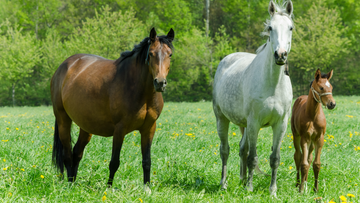Horse Pregnancy Basics
Horses are seasonal breeders and usually go into heat in late spring and early summer. Just like other mammals, horses develop from the combination of sperm and egg, and the fetus develops inside the mare’s uterus.
A full-term pregnancy for a mare is around 340 days. However, a healthy gestation can range from 320 to 380 days. Many factors influence the length of the gestation period, including:
- Health of the mare
- Health of the foal
- Mare’s age
- Mare’s breed

Proper nutrition will help both mare and foal. Even with adequate nutrition, your mare will develop many of the same physiological changes as a human. Your mare will gain weight and develop an enlarged belly. Additionally, you may see changes in her behavior, such as irritability and reduced activity. Regular exercise is still critical to the overall health of the mare and foal.
The Stages of Mare Gestation
Mare gestation is divided into three trimesters.
- Early Stage = Days 1 through 60
- Mid-Gestation = Days 61 through 210
- Final = Days 211 through birth
Early-Stage Development
The early stage of gestation in horses is crucial to fetal development. In this stage, the embryo attaches to the uterine wall, and the fetus begins to develop. You may not know your mare is pregnant for part of this stage.
A veterinarian can help you confirm the pregnancy and monitor your mare’s nutrients and hormones. The nutritional demands will change as the pregnancy advances. You must offer a balanced diet, including hay, grains, protein, and minerals.
Mid-Gestation Development
You will see the most development and growth of the fetus during this development period. Your mare will increase her caloric intake. However, she still needs regular, moderate exercise. Her muscles and bones will begin to shift to support the fetus. So, you should not push her through strenuous exercise.
Final Trimester Development
In the final stage, the mare’s body will prepare for delivery. In the last few weeks, the fetus will put on weight. The primary development is complete, and it is time to grow. Most foals weigh close to 100 pounds at birth. When it gets close to delivery, monitor her overall health and symptoms closely. Your mare will likely seek solitude before delivery.
Mare Care During Pregnancy
Nutritional Requirement
Pregnancy is very physically demanding for a mare. They need a balanced diet that includes vitamins, minerals, and protein. Forage is a vital component of a horse’s diet at all times. However, during pregnancy, it becomes even more important as it greatly promotes digestive health in response to the changing makeup of the abdomen.
Consult your veterinarian about the correct supplements and vitamins to give your mare.
Exercise and Activity Levels
Avoid strenuous work and exercise during pregnancy. That being said, light exercise is still essential for the overall health of the mare and foal. Natural movement in a paddock is an excellent exercise for a pregnant mare.
Veterinary Check-Ups
Regular veterinary visits will protect the health and development of the foal and mare. Your veterinarian will monitor growth, deliver vaccinations, and control parasites. They will also be on the lookout for any complications.






















